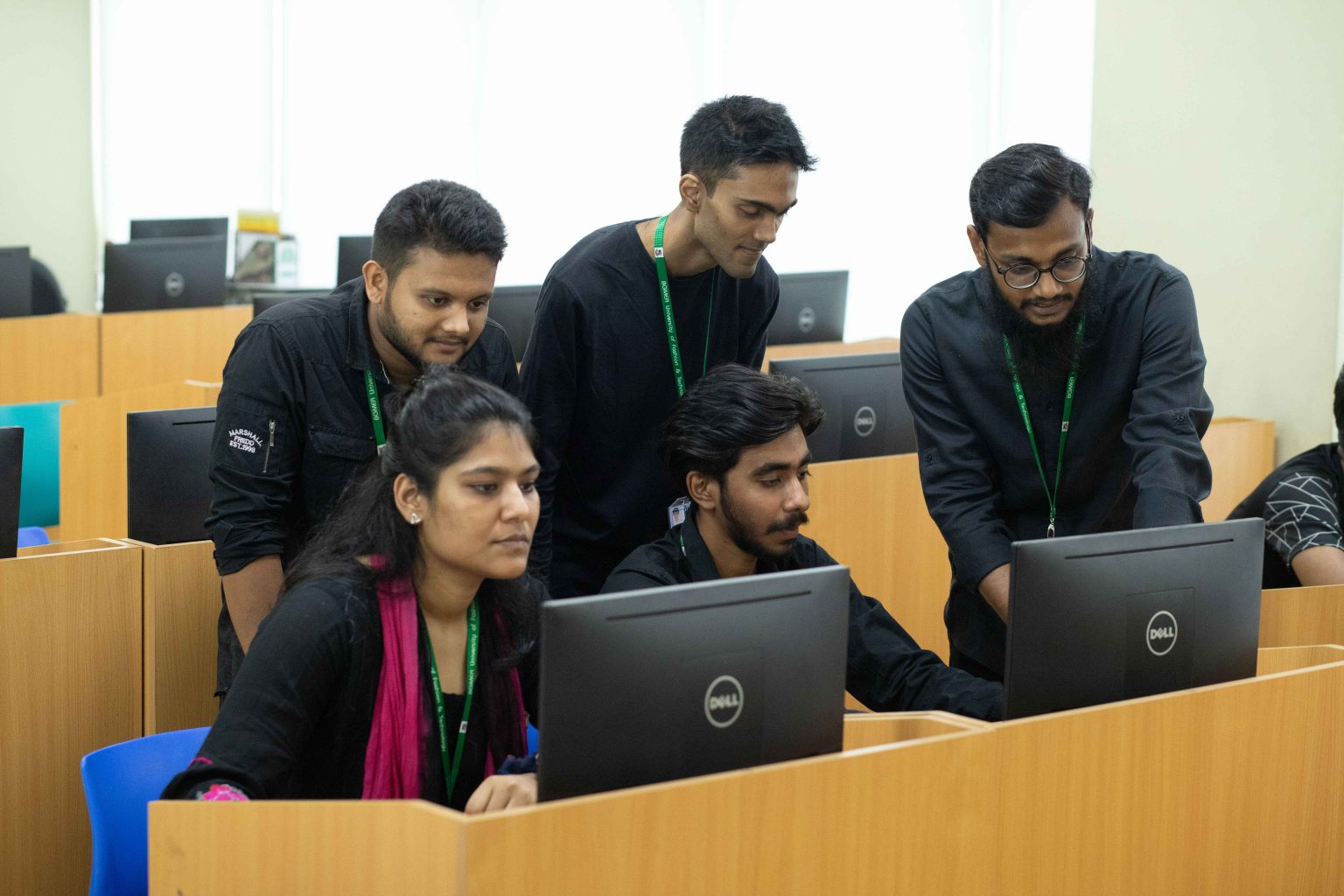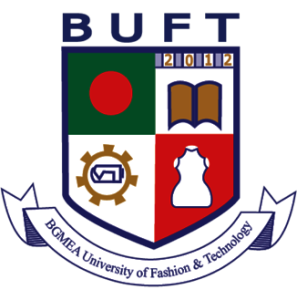DEPARTMENT OF
Computer Science & Engineering
Welcome!
Computer Science & Engineering is a rapidly evolving interdisciplinary field that is at the forefront of developing and implementing innovative technology solutions to address various social needs. With its diverse set of skills, knowledge, and problem-solving abilities, graduates of computer science and engineering programs are well-equipped to tackle complex issues across different industries and sectors. Their technical expertise, critical thinking skills, and collaborative problem-solving approach make them uniquely positioned to drive innovation and positively impact society, by developing effective solutions to complex social problems.
The Department of Computer Science & Engineering at BUFT is a new department, established in November 2022, with a mission to serve the needs of the nation by providing quality education and innovative, relevant research programs in computer science and engineering. The department aims to produce graduates who are well-equipped to meet the evolving needs of the technology industry and make meaningful contributions to society.
The department offers a B.Sc. in CSE program, as well as research opportunities and industry partnerships that equip students with the skills needed to succeed in the technology industry. Graduates of CSE programs are highly sought after across industries, including technology, finance, healthcare, and government. The department provides exposure to emerging technologies, including artificial intelligence, cybersecurity, machine learning, and data science, enabling graduates to become leaders in their fields. Students have numerous research opportunities, including collaboration with industry partners, that enable them to gain practical experience and make meaningful contributions to the field. The department also hosts industry events, hackathons, and networking opportunities that provide students with connections and potential job opportunities.
We welcome you to be a part of the department of Computer Science & Engineering family. Our faculty and staff are committed to helping students achieve their academic and professional goals, and we look forward to providing you with the knowledge, skills, and experiences needed to succeed in the dynamic and exciting field of computer science and engineering. Let us work together to meet the future challenges in the ICT sector and compete in the international market to make this country a “Smart Bangladesh.”
Academics
- Department of CSE
- New Students
- Teaching Staff
- Tuition Fees
- Further Information
Downloads
- Program Brochure
Vision
The department strives to maintain high status, concentrating on quality education and pioneering research to top technical, economic, and social development. It aspires that the graduates will be recognized as innovative leaders. The department works to pursue excellence in development, infrastructure, and diversity to increase outreach and connections both in and across the country to make a positive impact.
Mission
M 1: To provide quality education to meet the technological needs of society.
M 2: To carry out research in frontier areas of computer science and engineering.
M 3: To serve the community through extension and professional services.

Values
Excellence and Decency: The department strives for excellence in the area of computer science and engineering which is understood to come through practice, innovation and most importantly personal and professional integrity. We believe that excellence requires integrity, innovation, and continuous improvement.
Harmony and Respect: Remarkable activities succeed in an environment where people pursue what they are passionate about, apply skills they relish. and contribute to overall development as people are valued, trusted, and supported through professional positive relationships with colleagues, students, peers and the larger community.
Inclusion and Social Justice: Diverse comprehensive culture encourages acceptance of various backgrounds, perspectives and experiences while acting responsibly to ensure every opportunity is accessible to all.
Outreach: Quality of learning and exploration is enriched by interactions with industry, government, and mentors at all levels. Engagements with communities inside and outside of academe benefit the department, university, eventually country and the globe.
B.Sc. in CSE (Code: 621)
The Bachelor of Science in Computer Science and Engineering (B.Sc. in CSE) is a four-year program designed to give students a solid foundation in Computer Science and Computer Engineering. A student must earn 156.00credits from a wide range of courses provided by the University in order to earn a B.Sc. in Computer Science and Engineering degree in an internationally recognized engineering fraternity. This degree will be made significant contributions to the global betterment of lifestyle.
CSE curriculum integrates not just computational knowledge with applied engineering, but also other related subjects of study, including the humanities, accountancy, presentation skills, creativity, teamwork, and business and management abilities. In present-day industries, these abilities are seen as absolutely necessary for an engineer to tackle the challenges of real-world situations. In the majority of circumstances, a career in engineering entails a complex network of interconnected factors. An engineer operating in a real-world environment must be vigilant, proactive, and aware of all the surrounding situations. Therefore, education in CSE might be considered an example of a well-rounded education.

- Name of the Degree: Bachelor of Science in Computer Science & Engineering, abbreviated as BSc in CSE
- No. of credits: 156
- Curriculum: Outcome Based
- Medium of Instruction: English
- Duration: Four years (8 Semesters of Six Months each i.e: Spring and Fall)
- Courses Start: Spring (January) & Fall (July) each year
Standard time to attain the Degree: Four years (eight semesters, six months each) - Minimum grade to attain the Degree: 2.50 in a scale of 4.00
B.Sc. in CSE program has been designed with a mission is to discover ICT-based new ideas, promote knowledge and apply them for the welfare of the nation. The dedication of the department involves establishing a knowledge-based academic environment where the skilled faculty members offer their best output and students are encouraged to show their best performance.
The graduates will be familiar with an active research areas include image processing, pattern recognition, computer vision, software engineering, e-commerce, database systems, data mining, data warehousing, multimedia systems, computer networks, internet technologies, computer graphics, algorithms, signal processing, mobile computing, artificial intelligence, neural networks, robotics, embedded systems, parallel processing, machine translation, automatic program construction, and so on.
Program Educational Objectives [PEOs]
The educational objectives of B.Sc. in Computer Science and Engineering program are as follows:
PEO 1: Sound knowledge in the common fields of computer science and engineering founded by the profound inheritance of basic, major and general course curriculum to address any related issues.
PEO 2: Competence to work in fields requiring advanced knowledge, complex problem solving capability, maintaining restriction of time, requirement of multi-tasking and practice of ethical values.
PEO 3: Improvise lessons learnt by seeking higher education or novel design/development innovations for the betterment and as per necessity of the nature of response required by the society and industry.
Program Learning Outcomes [PLOs]
B.Sc. in Computer Science and Engineering graduates will be able to:
PLO 1: Technical knowledge: Apply the knowledge of mathematics, science, technical fundamentals, and a technical specialization to the solution of complex technical problems.
PLO 2: Problem analysis: Identify, formulate, review research literature, and analyze complex technical problems reaching substantiated conclusions using first principles of mathematics, sciences, and technical knowledge.
PLO 3: Design/development of solutions: Design solutions for complex technical problems and design system components or processes that meet the specified needs with appropriate consideration for the public health and safety, and the cultural, societal, and environmental considerations.
PLO 4: Conduct investigations of complex problems: Use research-based knowledge and research methods including design of experiments, analysis and interpretation of data, and synthesis of the information to provide valid conclusions.
PLO 5: Modern tool usage: Create, select, and apply appropriate techniques, resources, and modern technical and IT tools including prediction and modeling to complex technical activities with an understanding of the limitations.
PLO 6: The technologist and society: Apply reasoning informed by the contextual knowledge to assess societal, health, safety, legal and cultural issues and the consequent responsibilities relevant to the professional technical practices.
PLO 7: Environment and sustainability: Understand the impact of the professional technical solutions in societal and environmental contexts, demonstrate the knowledge of, and need for sustainable development.
PLO 8:Ethics: Apply ethical principles and commit to professional ethics, responsibilities, and norms of the technical practices.
PLO 9: Individual and teamwork: Function effectively as an individual, and as a member or leader in diverse teams, and in multidisciplinary settings.
PLO 10: Communication: Communicate effectively on complex technical activities with the technical community and with society at large, such as, being able to comprehend and write effective reports and design documentation, make effective presentations, and give and receive clear instructions.
PLO 11: Project management and finance: Demonstrate knowledge and understanding of the technical and management principles and apply these to one’s own work, as a member and leader in a team, to manage projects and in multidisciplinary environments.
PLO 12: Life-long learning: Recognize the need for, and have the preparation and ability to engage in independent and life-long learning in the broadest context of technological change.
